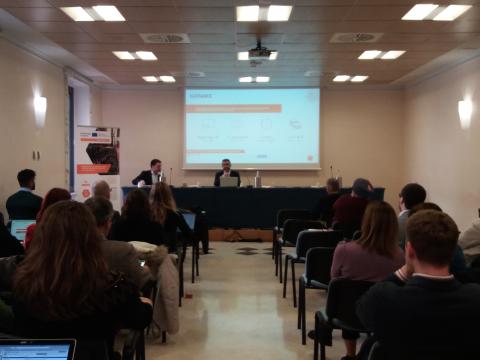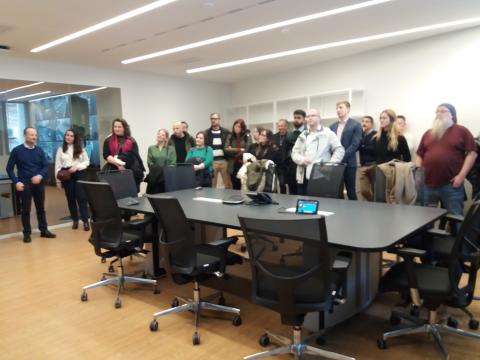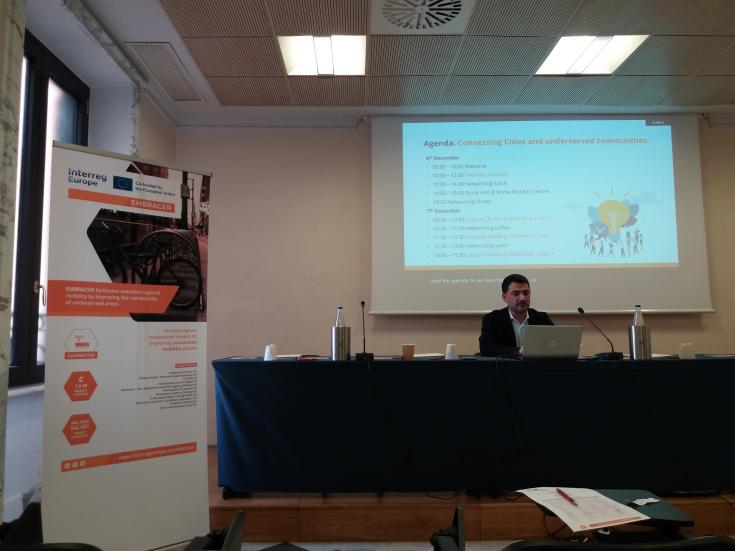EMBRACER 2° Exchange of Experience held in Rome!
Two days in Rome, Italy, with over 30 participants in presence and online, for discussing the “Current trends, emerging solutions & societal impacts in last-mile passenger travel” with the second Exchange of Experience event of EMBRACER, organized by TTS Italia and the Metropolitan City of Cagliari, joined by partners, industry experts, policymakers, and key stakeholders to share experience and discuss passenger travel challenges, focusing on covering topics related to urban-rural connections, modal shift, sustainable mobility, and Mobility as a Service (MaaS), addressing key barriers and enabling conditions.

On 6 December, inspiring presentations included an overview of EMBRACER, by Gennaro Cicarelli (inBlenda) representing TTS Italia, and SUSTANCE project, by the Central European Initiative – Executive Secretariat, which showed synergies on gathering efforts of promoting sustainable and inclusive mobility solutions. Insights from the Institute of Mobility and Transport in Portugal on Demand-Responsive Transport (DRT) challenges conclude that it is crucial to understand the social profile of potential passengers to better shape DRT services. It was also highlighted that the blurred boundaries between urban and rural spaces can be a current barrier to setting up an improved mobility service. The presentation from Cork Environmental Forum and Cork Transport & Mobility Forum outlined strategies to improve transport attractiveness, explore behaviour-oriented initiatives (like Bustival, Cycling Arts, and Social Media), and enhance planning and connectivity. The Metropolitan City of Cagliari showcased tailored solutions, including the Minimum Services Plan (a strategic plan aimed at identifying the minimum public road transport services required) and cycle path improvements. Collaborative efforts for sustainable mobility were emphasized by Sintagma S.r.l., and Tampere University explored the state of MaaS, focusing on the potential of MaaS for improving urban mobility by integrating various modes of transport into a seamless user experience. This first day concluded with an engaging Q&A session, followed by a study visit to the Rome Mobility Control Centre, showcasing operational insights and innovative technologies, such as more restricted emissions zones and the efforts to test on the ground different MaaS apps.

On 7 December started with a presentation from the University of Aveiro, an overview of mobility services in low-density areas, highlighting the unique challenges faced in these regions and exploring potential solutions such as flexible transport systems and ride-sharing. Local experiences from Bucharest Ilfov focusing on strategies for connections between urban and extra-urban areas, showed the importance of inclusive transport systems that fulfill the mobility needs of all citizens, regardless of their location or density, a perspective also shared with Municipality of Quartu Sant'Elena that emphasize the need for seamless transport networks that bridge gaps between different regions. Insights into DRT as a first and last-mile solution were discussed by the Intermunicipal Community of the Coimbra Region, in which the particularly relevant role flexible transport services have in meeting the needs of underserved communities. Shared innovative solutions that sparked interesting discussions included the out-of-the-box carpooling lines approach by ECOV, mainly envisaged to address car dependency and improve mobility options for public transport low-access communities. The solutions provided by autonomous shuttles were addressed in Ohmio presentation. The solution can be specially designed for suburban and rural areas. This presentation also explored future synergies in testing an autonomous bus in Vilnius. Updates on the Embracer Pilot action in Vilnius were provided by Municipal Enterprise Susisiekimo paslaugos, sharing the tasks completed so far and the formal approval obtained from the Vilnius City Municipality for the selected pilot site. Efforts from the Municipality of Ljutomer in sustainable mobility, including an automated bike-sharing system, showed community engagement.
The event provided a forum to share local experiences, showcase emerging technology-related solutions and pilot actions, and discuss community engagement in achieving sustainable transport goals. Efficient mobility systems between functional areas are essential, as well as the integration of different modes of transport to generate economic, environmental, and social benefits. To address mobility in peri-urban and rural areas, it was demonstrated the importance of promoting permeability, density, and mixed-use communities for sustainable and active travel. The event highlighted the collaborative efforts needed between public and private sectors to address transport challenges and create sustainable, inclusive, and innovative mobility solutions.
